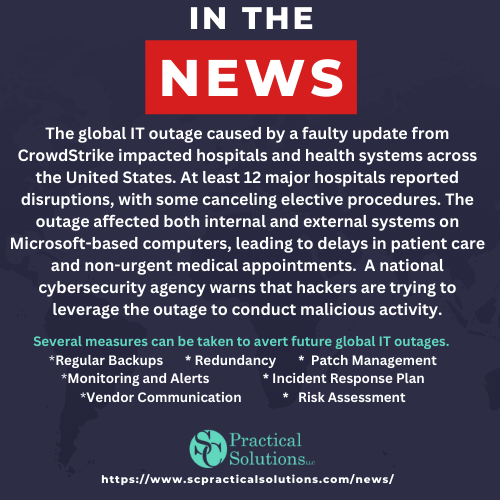
The global IT outage caused by a faulty update from CrowdStrike impacted hospitals and health systems across the United States. At least 12 major hospitals reported disruptions, with some canceling elective procedures. The outage affected both internal and external systems on Microsoft-based computers, leading to delays in patient care and non-urgent medical appointments. Hospitals like Cleveland Clinic, Mass General, and Nationwide Children’s Hospital were among those affected. A national cybersecurity agency warns that hackers are trying to leverage the outage to conduct malicious activity.
To prevent future global IT outages, organizations can take several measures:
- Regular Backups: Maintain frequent backups of critical systems and data. Regularly test the restoration process to ensure backups are reliable.
- Redundancy: Implement redundant systems and network infrastructure. Having backup servers, load balancers, and failover mechanisms can minimize downtime.
- Patch Management: Regularly apply security patches and updates. However, thoroughly test updates before deploying them to avoid issues like the one caused by the faulty CrowdStrike update.
- Monitoring and Alerts: Set up robust monitoring tools to detect anomalies, performance issues, or security threats. Configure alerts to notify IT teams promptly.
- Incident Response Plan: Develop and rehearse an incident response plan. This ensures a coordinated approach when unexpected events occur.
- Vendor Communication: Maintain open communication with software vendors. Understand their update processes and potential risks.
- Risk Assessment: Continuously assess risks related to software updates and third-party services. Prioritize critical systems and address vulnerabilities proactively.
LEARN MORE – CNN NEWS
LEARN MORE – FIERCE HEALTHCARE
LEARN MORE – American HOSPITAL ASSOCIATION
Posted In: Medical Practice
